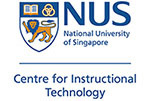 Mr Aaron Tan Tuck Choy, Lecturer, Department of Computer Science, School of Computing graces the Faculty Voice section in this issue. The winner of the Students' Choice Award 04/05 and 05/06 reveals the secrets of effective and interesting module websites.
Mr Aaron Tan Tuck Choy, Lecturer, Department of Computer Science, School of Computing graces the Faculty Voice section in this issue. The winner of the Students' Choice Award 04/05 and 05/06 reveals the secrets of effective and interesting module websites.
Congratulations on winning the Students' Choice Award once again! Please introduce yourself to our readers.
I am a lecturer at School of Computing, currently also holding the appointment of Assistant Dean in charge of Special Programmes. I teach programming and computer organisation, and I am also an advisor of the NUS Students' Computing Club.
Your module website for CS1101X Programming Methodology is consistently very popular with students. Why do you think this is so?
This question may be best left for the students to answer.
My own guess is that perhaps it scores on two fronts: attracting students on their first visit and making them return subsequently.
I created my personal website in year 1993 or 1994, way before websites became common and IVLE came into existence in 1998. Since then, I have picked up tips from various sources such as "Web Pages That Suck" on the do's and don'ts of web design. My design has thus evolved from one that was loud and flashy with many animated gif files, to being simple and plain but fast and functional.
What are the elements of a successful module website?
Besides a neat design, I feel that as a course website, it must serve its primary objectives, that are to provide instructive, relevant and interesting contents for the students. To engage students further, the website should be frequently updated with the introduction of new and timely materials.
My course website consists of a few sections:
a. Module information comprising module description, staff, schedules and policies;
b. Online resources such as links to other websites, and information on books and lectures;
c. Continual assessments including tutorials, laboratory exercises and term tests; and
d. Miscellaneous articles and information. In particular, since I am teaching modules that are taken mostly by freshmen, I have a page that provides useful information and guides for first-year students.
How does your module website complement your teaching?
Many students, especially freshmen, have to cope with a mountain of information. The module website provides a convenient place for the lecturers to put up essential information such as announcements, schedules, policies and rules, and other repositories so that students can refer to them as and when the need arises. A one-stop centre also reduces confusion and disputes. These help free up the lecturers' time so that the lecturers can focus more on the delivery of the course.
It goes without saying that the website extends the classroom into a virtual one, where students can explore more on their own outside class at their own pace.
What are the challenges you face in creating e-learning content for students?
I think the biggest challenge is time. To maintain and update a module website, it takes a lot of effort to keep things in place.
How do you source for content?
My main source comes from the Internet. I also create some of the content myself, such as articles and quizzes.
How do you use the module website in conjunction with IVLE?
I use the assessment and forum facilities in IVLE. I used to set up quizzes on my own module websites, but have transferred them over to the IVLE as the latter supports better functionality.
The IVLE forums encourage participation outside class. I open the access to all NUS staff and students so that other colleagues and senior students may join in the discussion. It is a good platform to gauge how much the students have understood the course materials, and what problems they are facing. I am also able to check whether students have done the reading assignments or exploratory questions that I have told them to do.
All in all, websites and IVLE are merely tools. What is still important is understanding the needs of the students and providing challenging and interesting experiences for them.
Thank you, Mr Tan, for your time and insights.

